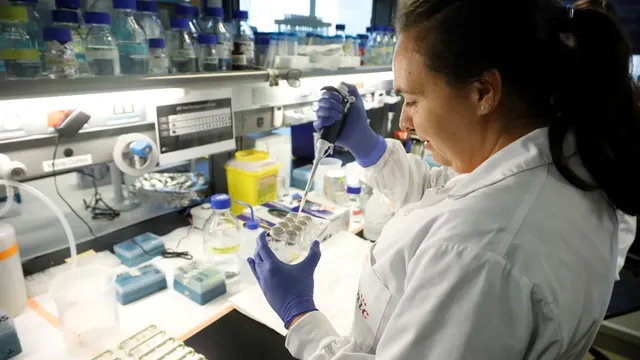A surprising discovery about sugar in the brain may help fight Alzheimer's, reports the website "Sciencealert".
Glucose stores in the brain may play a much more important role in the pathological degeneration of neurons than scientists had previously thought, opening the way to new methods of treating diseases such as Alzheimer's.
Alzheimer's is a tauopathy - a condition characterized by harmful accumulations of tau proteins in neurons. However, it is not yet clear whether these accumulations are a cause or a consequence of the disease. A new study adds important details by revealing significant interactions between tau and glucose in its stored form of glycogen.
Conducted by a team from the Buck Institute for Aging Research in the USA, the study sheds new light on the functions of glycogen in the brain. Until now, it was considered only a reserve source of energy for the liver and muscles.
“This new study challenges that notion, and with surprising implications,” says molecular biologist Pankaj Kapahi of the Buck Institute. “The glycogen build-up doesn’t just sit there in the brain; it’s involved in the pathological process.”
Building on previously established links between glycogen and neurodegeneration, the researchers found evidence of excessive glycogen levels in both fruit fly models of tauopathy and in brain cells from people with Alzheimer’s.
Further analysis revealed a key mechanism: Tau proteins disrupt the normal breakdown and use of glycogen in the brain, contributing to the dangerous accumulation of both tau and glycogen, as well as to the breakdown of protective barriers in neurons.
Crucial to this interaction is the activity of glycogen phosphorylase, or GlyP, the main enzyme responsible for converting glycogen into fuel that the body can use. When the researchers increased the production of GlyP in fruit flies, glycogen stores were reused, helping to combat cellular damage.
“By increasing GlyP activity, brain cells can better detoxify harmful reactive oxygen species, thereby reducing damage and even extending the lifespan of flies with tauopathy,” says Buck Institute biologist Sudipta Bar.
The team wondered whether a restricted diet—already linked to better brain health—would help. When fruit flies affected by tauopathy were placed on a low-protein diet, they lived longer and showed reduced brain damage, suggesting that the metabolic change induced by the diet may help increase GlyP.
It’s a remarkable set of findings, not least because it suggests a way in which glycogen and tau aggregation can be overcome in the brain. The researchers also developed a drug based on the molecule 8-Br-cAMP that mimics the effects of dietary restriction and has similar effects in flies in experiments.
The work could even tie into studies involving GLP-1 receptor agonists like Ozempic, which are designed to treat diabetes and weight loss but are now showing promise for protecting against dementia. The researchers suggest that this may be due to the drugs’ interaction with one of the glycogen pathways.
“By uncovering how neurons manage sugar, we may have discovered a new therapeutic strategy: one that targets the cell’s internal chemistry to combat age-related decline,” says Kapahi.
“As society ages, discoveries like this offer hope that better understanding—and perhaps rebalancing—the hidden sugar code in our brains could unlock powerful tools to combat dementia.” | BGNES

 Breaking news
Breaking news
 Europe
Europe
 Bulgaria
Bulgaria







